![]()
The Words of Hyung Jin Moon From 2012
|
|
The Words of Hyung Jin Moon From 2012 |
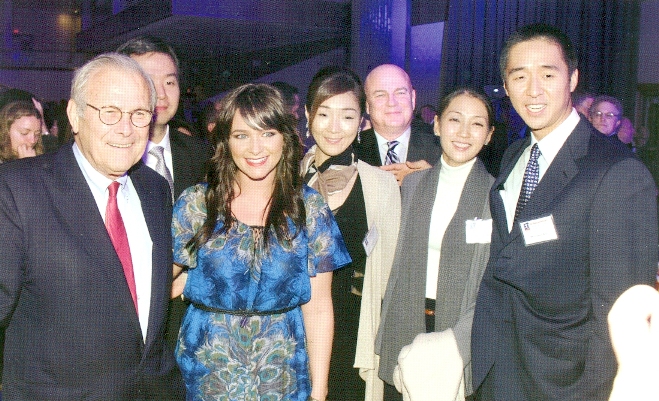
At
the Washington Times' thirtieth anniversary gala, two-time U. S.
Secretary of Defense Donald Rumsfeld, singer Krista Branch, with In
Sup Nim, Sun Jin Nim, Washington Times Corp. Chairman Tom McDevitt,
Yeon Ah Nim and Hyung Jin Nim
Question: The authority given True Children by True Parents appears to be absolute authority, and they appear accountable only to True Parents. Secondly, we members tend to deify the True Children... We are confused about True Children's value. How are they different from True Parents? How are they different from devoted second-generation members? Who are they accountable to? What will happen when True Mother ascends?
He asked very important questions about True Children's position, potential mistakes and accountability. You know, it's hard to keep True Children accountable. Also, about the deification of the True Family... One of the hardest things for us growing up was this kind of deification. From a very young age, we were expected to do things perfectly. We were just kids. There were super-high expectations. It was impossible to fulfill those expectations. We're all people who have to go through formation, growth and maturation. I think that process takes a different amount of time for different people.
Of course, Father saw all his blessed families as his children -- African children, Russian children, etc. He didn't see just Korean people being his children or his race being his children or a particular chosen people being his children but all the families that he blessed. So, I think that within that reality, True Family is also one of those categories. Many scholars see these categories as castes within our movement. They do separate. I know many Jacob children, who enter the church at, say, four months old, and through no fault of their own are treated as second-class citizens, whether we recognize it or not. These kinds of distinctions of course create problems within the movement.

Personally, I'd like to focus on the fact that whether you are first-gen, second-gen, Jacob child, whatever, we have the same responsibility. We have the same mission and purpose to spread True Parents' teachings. We have the same responsibilities. True Family members have the same responsibility....
Father always spoke about engrafting onto the olive tree over time; and he had plans to marry all his children into all your children. I think Father's plan was always that all the blessed families' descendants would be married into the True Family. He opened it up to international marriages in the third generation. Now, we have people in Father's family, the True Family, that are Japanese, American, and so forth.
I think those the big castes, big separations break down over time. Most of those in the third-generation of the True Family are down to earth; they are normal children. They don't have a huge head on their shoulders. Each one is different. I think that as time passes, the big distinction fades naturally.
Theologically, we have to be clear that no one plays the messianic role. The Lord at his Second Advent is only one who comes from the God of Night, as Father mentioned in his speech, particularly the one in Incheon. That is a unique role, Jesus' role and True Father's role. As children, we are more here to spread True Parents' teachings, to bring them glory, to bring them joy. That's our responsibility. I don't know what will happen in the future [when True Mother ascends], but if you meant by that, "Would True Children be in the position of True Father, having absolute authority?," absolutely not. Not the way I see it. Even though I am the international president, in Korea we purposely made a system to limit my authority. We introduced checks and balances. For example, we brought in management that only allows decisions to be made through a decision chain. All the directors and various others in responsibility have to approve a proposal. It goes from bottom up. If I wanted to start something, it had to be approved. By doing this, we have effectively limited absolute power; whereas in the past, if someone had this role, he would basically have free reign to do anything and to use finances freely. That's not the case with this kind of check and balance system.
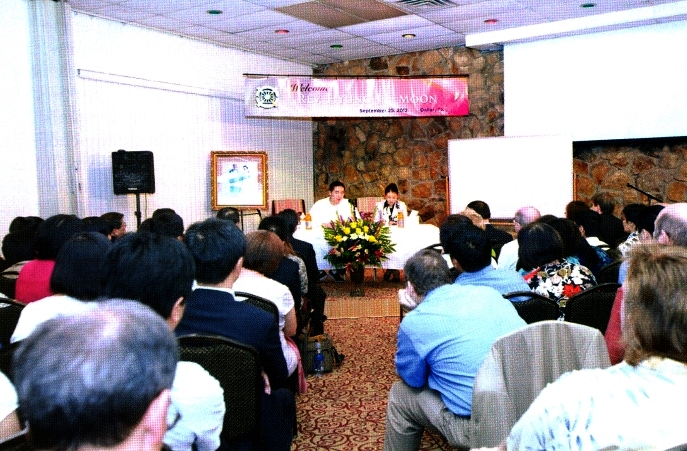
Across
America, members asked sometimes penetrating questions in an effort
to deal with controversy, dispel emotional tension and make a fresh
start behind Hyung Jin Nim and Yeon Ah Nim, whom True Mother
appointed to lead the nation in September.
Question: Seattle is in a unique situation because UCI has chosen it as its headquarters. My question is, since In Jin Nim stepped down under the circumstances that she did, will the status of the UCI chairman be reconsidered? In particular, In Jin Nim's motivation for initiating two national tours, to discredit the UCI chairman and his board, could now be questioned. I wonder if that's likely.
Many people ask particularly about unity between the brothers, or Cain and Abel. They say you're kind of like in Jacob and Esau's situation, things like that. What people have to understand is that True Children are different people. We have different paths in life. We could strive for a superficial unity, which is like us standing onstage and singing Kumbaya together. But that's not real. It's more of a performance.
We have the same purpose with True Family members that we work with -- to glorify True Parents, spread their word and bring them joy. That purpose defines our life path. Hyun Jin hyung made it very clear that he wants nothing to do with the Unification Church. He made that media statement when he was in Korea this time. So, he has made a public declaration. Obviously, that's saddening. I love the guy. I love my brother. If you know anything about me, I spent lots of time with him, particularly when I was in high school. I was very close to him. We used to have dancing battles in the cottage on the second floor. I was very close to him. I love him dearly. Of course, I disagree with him. Him being a free individual, I cannot coerce or force him to do anything. If you know anything about me, I don't disrespect my elders, even if they are yelling at me or smacking me on the head; I always try to treat them with respect. In the case of Hyun Jin hyung, I think he's made very clear which path he wants to follow. That's a path that he's chosen and people who follow him have chosen. Obviously, that's a path that is separate from the one that we are choosing In terms of superficial unity, am I striving for that? Absolutely not. I'm not striving to put on some show or performance. In terms of real unity, purposeful unity, that depends on both parties' 5 percent.
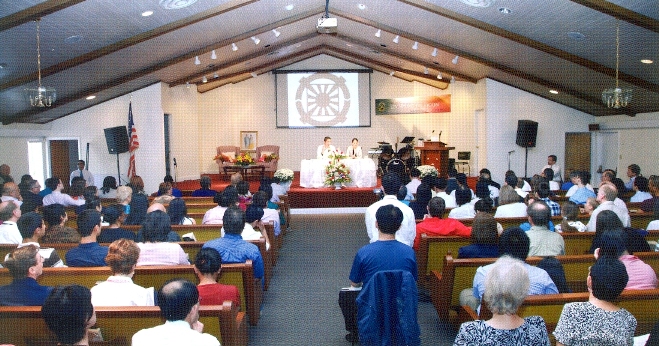
I know their organization is trying to spread rumors that they were prevented from coming up [to the palace]. Of course, this is far from the case. They came to the funeral in buses. They were asked to go through the stadiums like everybody else -- every member in the entire world, including VIPs and ambassadors for peace. Pay your respects at the stadium and then if you are invited, you can come up to the Peace Palace. Hyun Jin hyung didn't have to follow those rules; he could have come to the peace palace directly, and all he had to do was meet Mother, which of course is totally principled, because she's True Mother. He chose not to do that. There wet members holding signs that said "Hyun Jin Nim, go up the hill." That's all he had to do and he chose not to. They held demonstrations. They brought media to try to stage an event that basically said they were being prevented from coming up. That was very disappointing.
It was very simple, just come up the hill to meet Mother. Mother was waiting the entire time. She was sending people down. Mother actually went and met Hyun Jin hyung at the Walker Hill Hotel. That didn't go well. Even Mother was very much pressured -- "Just go meet him," etcetera. So, she did, it went terribly. She was of course heartbroken.
So, I think that our communities have to understand that regardless of what happens... Even in the case of In Jin, which is a heartbreaking case... It's obviously a sin. Of course this is not the blessing. Mother has been very clear. There was some talk about a satellite blessing. This is not a blessing. There is a process when a True Family member gets blessed. True Parents have to actually approve the blessing. In the case of any of the True Children, I think our relationships don't end with them in the sense that we stop loving them. We can disagree with them, of course. But we don't stop loving each other. That is clear in our hearts. But again, the only way that we work together with any True Family member, whether it be the oldest to the youngest, has to be based on purpose and a common desire in our role to glorify True Parents -- spread True Parents' teachings and bring them joy.
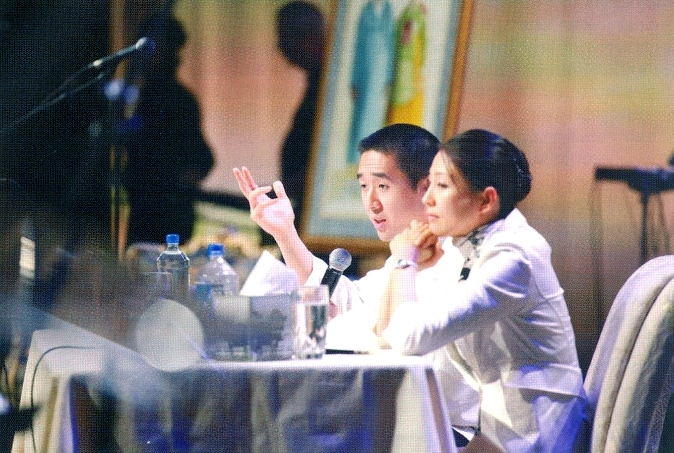
Question: You mentioned the government is archangelic in nature; I see that religions are also archangelic. It's a path we follow until we receive the blessing, but once we receive the blessing and establish a God-centered family, God exerts sovereignty through the family. I would like to see a structure more like the one Father talked about -- a family federation, an association of sovereign entities that work together with a common purpose and vision. It's not a top-down structure, which I see as archangelic. In families, the members hold one another accountable, but in these larger organizations, it's very difficult for people on the grassroots level to hold those above them accountable.
I think that top down structures are kind of archangelic and hard to hold accountable. We are looking at various systems. In the Mormon Church, you know, they have no paid clergy.
Each member, basically, at some point has to lead the congregation even if for just one week and a weekend. That's healthy pressure for everybody to learn the theology, learn the teachings and be ready to be called on and be able to minister. As they say in Asia, "No pressure, no rice." [Laughter] Just having the minister always pastoring is one thing, but in the Mormon tradition -- which builds so much ownership into the teachings and into the expansion of the teaching -- is the whole idea that one day you are going to be called on. You are an elder in the community so to speak. Even if you are a young person, you are referred to as an elder.
We have already done elections in Korea and Japan. I know you guys have been waiting forty plus years for this. We are going to do it. [Applause] We elected our regional directors. We also elected district pastors. This idea is not concrete yet, but even in some areas where there are very small communities, a group of elders and a chair of elders or a rotation system would be more appropriate than paid clergy.
The whole thing with Freedom Society is that you don't want a big federal government. It's the same thing. We don't want a big federal [church] government. We want to keep it mean and lean. It does its functions but it's not like a monster sitting on top. We want to give a lot more authority to the local states, to your local communities. Of course, that also makes you more responsible for your local community so if you wanted to build a building, build a school, you would have to raise money for that. At the same time, being able to choose leadership in those local communities is very important. It's a very American idea. Elections and the whole tribal messiah movement that Father initiated, and toward the end very heavily emphasized, are strong aspects of our tradition.
Are we going to go back to being the Family Federation? I think we're a church. The reason we're a church is that we save souls. We are not only a federation of families with families that have sovereignty over themselves, that save themselves. We are a community and in that church community, we have responsibility to bring people to the blessing. We have the responsibility of growing them in their faith. We have the responsibility of helping each other, checking each other, giving each other feedback. If people are straying, we can give feedback. Things like that. That is why the function of a church is important, until we reach perfection, of course. So obviously, church is absolutely essential. Religion being the archangel... I agree it's true about certain aspects. I think this ties in with the whole idea of Freedom Society.
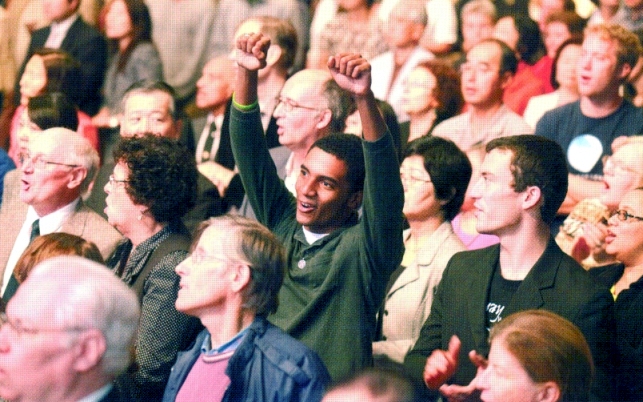
Up until now (and this is very close to me because I studied various religions) I hate to say it, but I didn't find hope in the Unification Church, growing up in it. I didn't find any- thing unique. I studied other religions because I wanted to find alternatives. I really was seeking.
One of the things, about a young person that first-gens sometimes miss, is that we don't necessarily believe in God. You guys, when you joined, you believed in God. Yes? Yes. That's a good starting point. [Laughter] People who are born into the tradition, we don't necessarily believe in God. You see? We are not even sure on that issue, let alone Principle or Jesus or Moses or Abraham. If there is no God, that makes no sense. For me, all these things were on my mind, which led me to study religion and explore religion. I gained so much through studying religion.
All the major [religious] traditions, up until now, have been supporting an archangelic position in the sense that they were supporting the archangel, the government institutions and actually being used to grow them. And this is what I felt was not exciting about the Unification Church.
I didn't see how, if we expanded to the nation-state, we would run the nation; I thought we would make Iran or the Taliban, a theocracy, or something like that, something crazy. I didn't feel any inspiration to be part of that, honestly speaking.
As I was growing up, I wondered, if we would allow freedom of religion or would force everyone to become Unificationists if we had a nation. In the past, honestly speaking, I thought we would use government power to force people to believe in True Parents. Or, since we don't drink, we would make alcohol illegal. We would use government to legislate morality. I think, in the past, absolutely we would've done that.
The question is, does trying to legislate morality create a more moral society? No. It's also not what God did. God taught morals, but he didn't create a big government to enforce them. He gave Adam and Eve freedom, but they had full responsibility with that freedom.
This is one of the things that Walter Williams writes on, he's writes on Economics. He's out at George Mason University, and he's an African-American. He writes on the black family, which many liberals claim was destroyed by slavery. He looks at statistics. You look the black families before the 1940s, before the nanny state, and eight out of ten black families were intact. Eighty percent had moms and dads. Now, it's 30 percent; it's three out of ten. We can see actually what happens with the nanny state, when you have the welfare state that politicians promoted as such a great thing -- all these great slogans they have, like "we have to help single moms." Actually, what happens is that in order to get the welfare check, the husband, the male, cannot be in the house. Korea has the same law.
This is why Freedom Society is so exciting for me, because there has never been a religion that has such a clarified view on divine rights and democracy. You know, in democracy, divine rights are fundamental to its proposition. If your rights come from the state, or from government, the government can change your rights. It's critical that you start with a divine rights proposition for the philosophy of democracy, or freedom. Those rights come from a divine creator, therefore no secular institution can change them. There is no tradition that has such a clarified view of the divine right and the freedom of will that God gives to human beings, including, of course, the choice to live or die. Adam and Eve made the choice to live or die. At the same time, that he bestows individual responsibility on them. God did not create a big government. He did not create a militia. He did not create a police force, a big military -- or big chastity belts. He taught them morality. He taught them what was sinful and what was not, giving them the freedom of will to choose. This is so important.
It's a Headwing type of philosophy; that's why I find it so exciting. I've never been interested in economics. I've never been interested in politics. But because of this hermeneutic, this method of interpretation, that Kook Jin Nim, through his life experience, has discovered, it shows the potential in the Principle. Now we have the potential to have a unique voice in public policy. We have the potential to have a unique voice in economics.
In the past, religions have been archangelic, which is why the Principle says that a new truth, a new faith must arise. Our theology is comprehensive, a political, economic and social theology. I don't know of any other religion that has this comprehensive a theology.
Another thing that is exciting about Freedom Society is that finally, we know how Satan does it. He uses the archangelic organization of government -- which is supposed to be the servant, serving and protecting the people -- to promise the people many things and to actually become their master. By doing that, he can destroy families; he can destroy morality and he can change society into a godless culture. He can apply pressure to indoctrinate us into believing that. Growing up in society, we are bombarded. When I went to elementary school, middle school, high school, you are bombarded. It is eight hours a day -- if you have any other views, you are homophobic. You are outcast. Your friends ask, what's wrong with you? Oh, you believe in that stuff.
If you go to liberal a university, you're bombarded even more. If you watch television, you're bombarded again. You may not know it, but we are inculcated with liberal philosophy, totally inculcated. The pressure is so strong, that young people feel they have to hide what they believe. Basically, even to survive, you won't speak out against anything. I felt like this, too, at Harvard. They talk about tolerance, but the most intolerant place is in a liberal community. There is no tolerance of other ideas; it's an orthodoxy, and if you believe a different thing, you will be attacked, absolutely. Because of this pressure, many people buckle; it's hard to stick to your beliefs. I think those things are operative in the way we grow up in the community, but we never knew how that happened, how the Archangel was using that, in terms of your point that religion is archangelic. This is why now our theology is so exciting, so powerful. We can now identify how Satan breaks down freedom; how he creates tyranny; how he does woo us into believing in him, into marrying him, just as he did in the Garden.
This is why I think it is such a unique interpretation and the public policies we can derive out of that are unique. If we are truly going to move America, get America back to being the pillar of strength for the world, we want to reach out to a citizen of the nation with these kinds of things and be able to help the citizen understand how powerful the Principle is. And it is; it's so powerful.
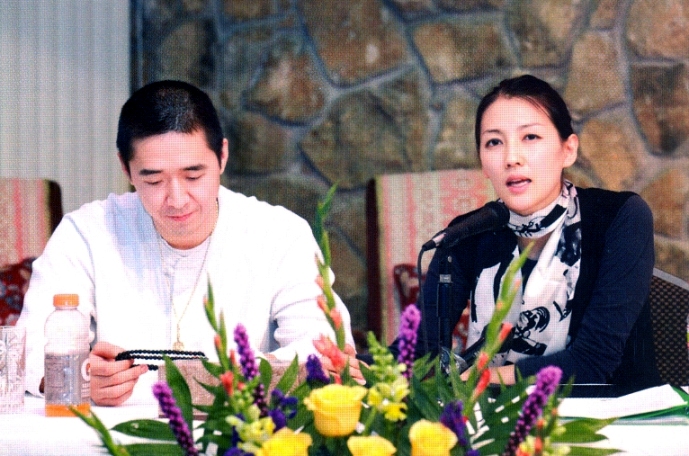
Question: My heart goes out to your brother, too, who has been suffering a lot.... How will the services go in the future? I felt as if we were evolving, fitting the needs of people outside the movement. Would you ever hold a Lovin' Life Ministries style of service? Pertaining to GPA, raising funds is useful, but might we teach young members how to do business? Regarding, Chung Pyung, will one ever be made in the U.S.?
How will services look? In Korea, the first week's service often comprises sharing announcements for the month, what True Parents are doing, and what big events are coming up. The other weeks, we have the assistant pastors practicing ministry conducting the service. They have oratory skills practice and practice preparing sermons, all the things that they have to do.
In America, I think we can go a step further. We are contemplating that in the third week we'll have someone in the congregation prepare the sermon. Not by coercion, but if you want to give the sermon, we'd open the third week up. Our members can take ownership of the theology, ownership of the faith, even though they're not in the clergy, and prepare the sermon.
Of course, there is a process of feedback; you would submit your sermon to a group of elders, and you would give it to the minister and they would give you appropriate feedback. If there are theological points that they would need to point out, that would be a way to help each other. I think that's nice, because it gives nice healthy pressure to everybody to actually understand the Unification Church theology, and to be able to teach it one day. Think about how easy it is to invite somebody, you go to your neighbor's house -- Hey Rick, I'm giving a speech at my church today, could you come and support me? I think it's a very natural way to invite people that you know. In the fourth week, the pastors would practice again. They do need to practice their oratorical skills and to find scriptural evidence for their sermons. The more you do it, the better you become.

In Korea, we focused on creating life cycle management, education programs from when you're in the womb, when the mother is pregnant. We have a program for when the mother would be preparing for the baby; she'd be making the Eighth- Day Ceremony clothes. She'd be meeting other moms who are having a baby soon. There was a wonderful step-by-step program there. That would transition through elementary school, middle school, high school, college and beyond college to a professional group–when you get older, how to prepare for your death, how to lead a rich and fulfilling life of faith as you get older. We look at the entirety of a person's life, focusing on how to make transitions easier. For example, we had a high school group, and we had members of the college group mentoring the high school students. In that way, when the high school students got to college, they would already have friends there. Instead of having one church education system in high school and a clearly different education system when they got to college, we tried to make the transition smoother as the person goes through life. We focus on life cycle education. In the headquarters, we will have to look at what is overlapping and what is not needed.
Chung Pyung in the U.S. -- can Chung Pyung be in your garage is what you're asking, right? [Laughter] In Cheon Seong Gyeong, Father says that there has to be multiple Chung Pyungs around the world. I don't know if Mother has any plans for that. So, I can't answer that. You asked about ancestor liberation in the churches. Our churches, particularly in Japan, were already doing ancestor liberations in the beginning. During the witnessing process, when people were being witnessed into the church, one of the ceremonies they would do for the new members is to pray for their ancestors and also do liberation ceremonies. Initially that was done in the churches before it was done at Chung Pyung. One of the questions we've asked True Parents is if that authority can be given back to the churches, so that the churches can do ancestor liberation. In that way, a greater number of spiritual activities would happen in the churches. Of course, now only True Mother can decide.
You asked about self-sustainability. It's important, number one, for the nation to be self-sustainable. I don't know the situation with America. I know we're receiving subsidies for our businesses here, like at the Washington -Fillies. Some years we were receiving close to $100 million from Japan. It's been reduced a lot as I understand, but still -- think about it if you guys had to pay $100 million a year for the Washington Times -- would you pay? Would you actually pay it? Would you donate that much? We have to understand that over the last thirty years, the American movement, the Korean movement -- all the movements -- were funded out of Japan. Most of the businesses were as well. This is not a responsible system, so what we did in Korea was we stopped the subsidies. As soon as we went to Korea, we said that on the church side, we would take no more money from Japan. The church in Korea was receiving $10 million a year in low years. We stopped it immediately. We said that the Korean church was going to step up; we are not going to expect Japanese members to pay for it. I don't know how much in subsidies America's receiving, but on the church side, if we're receiving money from Japan, we're going to stop it.
We're going to pay for our own church in America. We have to make sure, first of all, that the national church is sustainable.
Eventually, Korea donated to Japan. Cheon Bok Gung donated hundreds of thousands of dollars, after the tsunami. The church headquarters donated close to a million. It's nothing compared to what Japan gave in subsidizing the Korean church for thirty years, but it was a spiritual start. It was a show of gratitude, saying we were not going to continue this pattern of abuse.
In terms of our home church, we first have to make our national church sustainable.